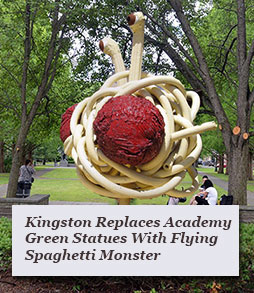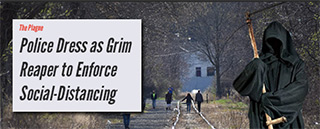
ELLENVILLE- While other towns and cities across the Hudson Valley contend with rising housing costs and displacement of existing residents and businesses, this little village at the foot of the Catskills has remained blessedly free of gentrification.
“We like things just as they are,” said Mayor Geoff Princeton, who arrived at our interview at the local Stewart’s in a 2002 Ford Focus with a “Not Worth Stealing” sticker on the rear bumper. “We saw other towns bend over backwards to bring in developers, artists, state grants. Now they have gentrification. As Biggie said, ‘mo money, ‘mo problems.”
Diane Kutsher, chair of the Chamber of Commerce, agreed.
“You start out with vacant storefronts, broken windows, ruined factories. You want to fix things up and ‘grow the taxbase.’ If you achieve your goal — and that’s a big if — you end up pricing out the residents, who either need to uproot themselves and move to another down-on-its-ass town, or get subsidized housing or rent control, which of course costs public money and distorts the market. And taxes never really go down- they go up even faster, because increased property values and economic activity bring in more revenue, and no government in history ever cut spending when it didn’t have to. And the residents are annoyed because the humble, unpretentious diner that was standing since 1958 gets replaced by a hipster joint with $15 hamburgers and a strong Instagram presence. There are more jobs than there were, but its relatively low-paying service work, which does little to offset the new higher cost of living.”
In the view of Ellenville’s leaders, progress is an illusion; communities trade one set of problems for another. Residents don’t become happier; if anything, they’re less satisfied because they thought all the striving and work would pay off. It never does. Eventually, the more enlightened among them realize that desire is the root of all suffering, and to be at peace, they must let go.
“The same goes for the nation as a whole,” said Princeton. “We always hear ‘this is the first generation that won’t have a better standard of living than their parents; what a tragedy.’ And we’re like, ‘great!’ The so-called higher standard of living they’re talking about resulted in an explosion in air and water pollution, loss of open space and wildlife habitat, consumerism, everybody working more hours just to stay in the same place, alienation, McMansions, SUVs, space junk, the sixth mass extinction, the Pacific garbage patch, and the cooking of the planet. Anyone who looks at 21st century humanity realizes we’ve created an unsustainable system that demands constant growth, which is the ideology of the cancer cell, not a path to lasting happiness and a balanced coexistence on Earth, our only home.”
“You could say our no-growth, weekender-discouraging approach has made us one of the greenest places in New York State,” said Kutsher. “But we don’t. Start talking that way and you’ll get on the radar of tourists and the state public relations department. No thank you!”
At this point, we decided to ask our waitress, Susan Grossinger, 33, an Ellenville native, if she agreed with what was being said by her village leaders.
“Absolutely,” she said. “I’d take it further. We should not only cease the neverending quest for economic and population growth, but stop procreation entirely. Human consciousness is a cosmic joke. Our births are a violent, unconsented thrusting into existence from the peace of oblivion.”
“Well I don’t know if I’d go that far,” said Kutsher. “If I felt that way I’d probably commit suicide.”
“You misunderstand,” replied Grossinger. “Life has its pleasures, I agree. But on balance, there’s more bad than good. If everything goes perfectly you’ll live long enough to see everyone you love die before succumbing yourself after years of declining health. While I’m here I’ll play my part, pay my dues, and get my kicks where I can, but there’s no question it would have been better not to have been. If everyone made the choice not to have children, in 100 years the planet would be free of the plague of humanity. Hell, even better would be if all sentient life followed us. Look at the animals, eking out a few years at best in a state of constant terror before starving to death or being devoured alive. Just imagine a planet whose only lifeforms were plants, serenely turning, day and night, year after year, hurricanes battering indifferent shores, the only sound on a summer’s day the rustle of wind through the treetops and the babbling of water flowing over bare rock.”
The three then gazed wistfully out the window at the Shawangunk Ridge.




